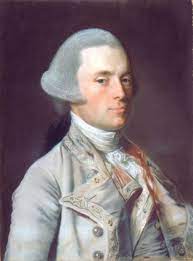Americanism Redux
November 23, 250 years ago today
Today, 250 years ago, the announcement comes forth in a document read aloud to the people of New Hampshire: “to be religiously observed and kept as a day of public thanksgiving”, a day next week will be set aside to express the people’s gratitude and gratefulness for their British Monarch, King George III. New Hampshire’s royal governor John Wentworth has decreed it so. It is the British King who ensures the rights and freedoms enjoyed by the colony’s residents, Wentworth asserts. Be thankful for the king and the one people to whom we belong.
(Wentworth)
Today, 250 years ago, a different reason for thankfulness brings seven men to a house in Fredericksburg, Virginia. The house has been built by the youngest brother of their former commander, Colonel George Washington. The seven men huddle for hours around and over a document consisting of several pages. They’d served with, taken orders from, and above all, trusted Colonel Washington in their 1754-1758 duty in the Virginia Regiment back in the French and Indian War. Now, with tankards of ale, a warm fire crackling in the fireplace, plates of roasted meats and vegetables, they put finishing touches on a three-part statement about accessing portions of 200,000 acres of land set aside for their wartime duty with Washington. Soldiers in the ranks will qualify for land, too. Washington and a colleague had surveyed western lands that the British colony of Virginia had used as future payment for their British colonial services against the French. With new lands in their possession, the future will look bright and shining. Be thankful for the acreage in the partly known west.
(meeting site, house that Charles Washington built)
Today, 250 years ago, the town council of Roxbury, a village near Boston, Massachusetts, is thankful for a sudden piece of new news. At today’s meeting, the council votes to reject interference in the British colony’s local courts and local judges by policies, funds, and personnel tied directly to British authorities in England. Surely, the council adds, King George III recognizes that legal and judicial independence is a hallmark of British life regardless of location. In addition, after this vote, the same council today unexpectedly receives a copy of a “statement of rights and an enumeration of the violations of rights” from an entity newly established last week in Boston, the Committee of Correspondence. The Roxbury council votes to choose nine of its members to answer the document received by the Boston Committee of Correspondence. Be thankful for the chance to consider what to do about our situation, both in detail in courtrooms and in general principles across all of life.
(Roxbury)
Also
Captain James Cook and his two tiny naval vessels leave Cape Town on the southern tip of the African continent, sailing east into the “unknown.” He has information about an undiscovered “southern continent.”
Cook and his ships “Resolution” and “Adventure” are the latest form of an action from decades and generations before. Since the late 1500s, each British settlement and ultimately the thirteen British colonies in North America could be traced back to some early landing by a crew, its commander, and the contents of their vessels. And each of the earliest could be said to have encountered some form of unknown.
(Cook)
Before a founding is a belief in the unknown. In a founding is discovery of cause for thanksgiving. After a founding is a series of next reflections on the discovery, the cause, the thanksgiving and a judgment of worth and wellness. In a way, the reflection series is also a journey into the unknown.
You Now
Thankfulness for a power bigger than us, for a change to a place different from here, for a recovery and rejuvenation of what we’ve long had before now. Imperfect though they are, each of these three thank-you’s finds expression in the royal governor’s proclamation, or the former officers’ document, or the town council’s votes.
In our series, only one of the three is an engine of its own. That engine is the Roxbury council’s votes. The councilors are astonishingly quick to build from Boston’s uneasiness over judicial structures and, most importantly, the new entities called the Committees of Correspondence. The potential for a shocking degree of rapid growth of tensions is now in sight. The same sort of built-in motion doesn’t seem as real and alive in the royal proclamation or the former officers’ resolves.
Suggestion
Look for the clearest prospect of forward motion in your cause for thankfulness. Look for the key to start the engine.












